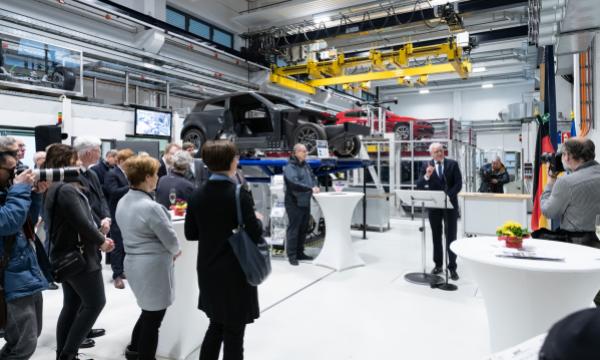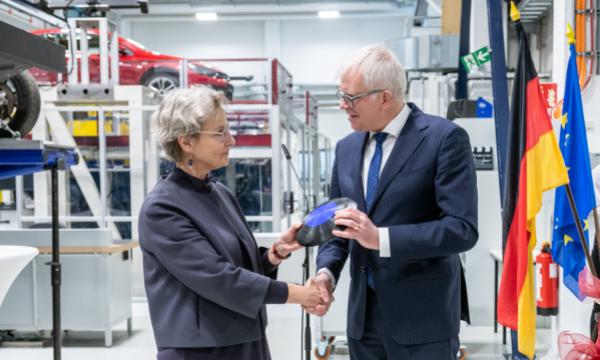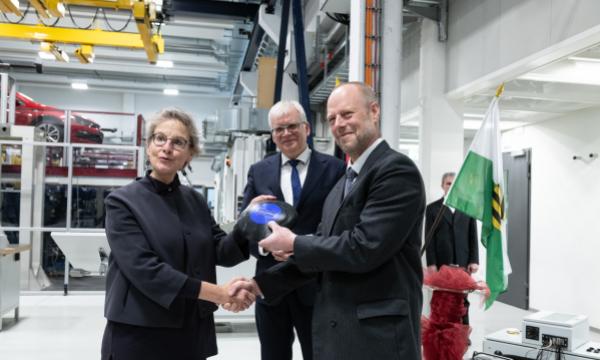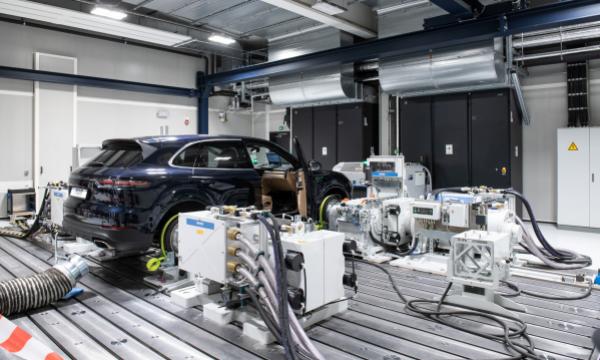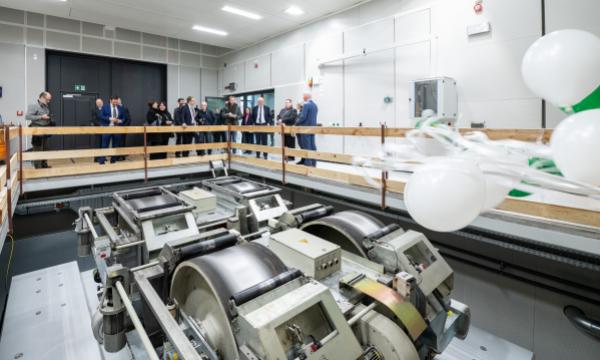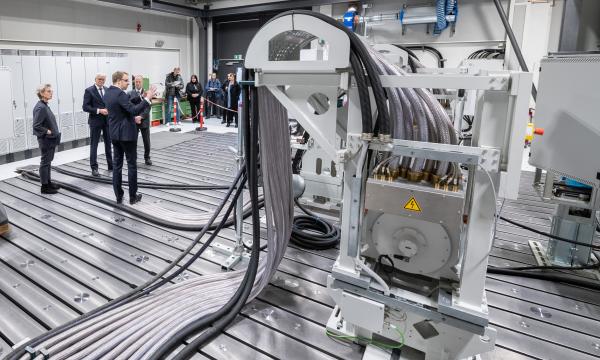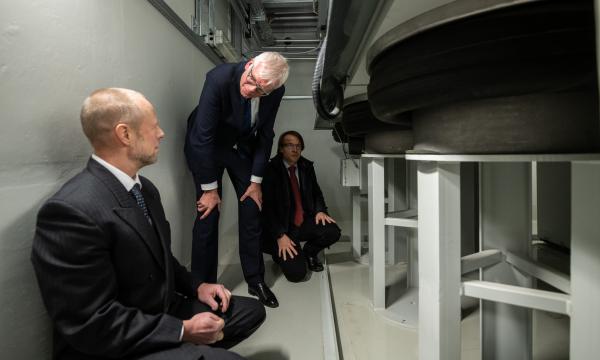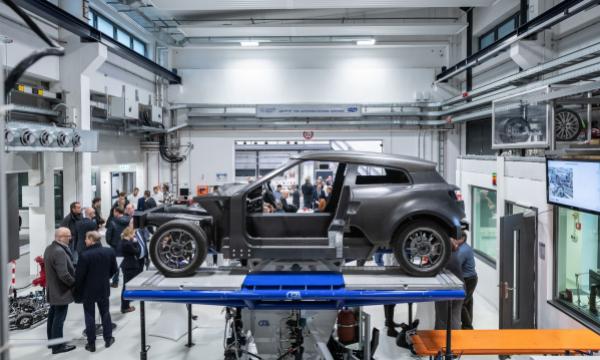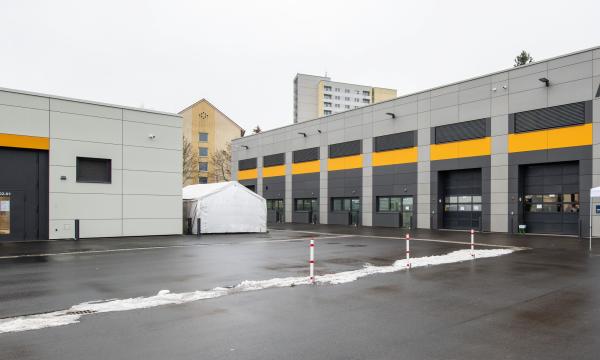
You are here
Research into the mobility of the future
Research facility at the "Friedrich List" Faculty of Transport and Traffic Sciences is unique in the European research and university landscape - Research on safe and efficient automated driving.
The Saxon Minister of Finance Hartmut Vorjohann officially handed over the new Vehicle Testing Centre (FVZ) of the Institute of Automobile Engineering Dresden (IAD)* at TU Dresden to the Rector of TU Dresden, Prof. Dr. Ursula M. Staudinger on 27. January 2023. The test centre for research into the safe and automated mobility of the future is unique in the research and university landscape in Europe due to its close practical relevance and the combination of test facilities.
The investment volume is around 37 million euros. Of this, 33 million euros come from the European Regional Development Fund. The Free State's share is around 4 million euros.
Minister of Finance: Two rebuilt and refurbished halls with state-of-the-art test benches for vehicles offer excellent, interdisciplinary and practice-oriented conditions for top European research. The new research buildings and their technical equipment have created a unique test centre. Autonomous and energy-efficient driving are the topics of the future in automotive engineering, on which research is being carried out at a world level in the automotive state of Saxony.
Rector Prof. Dr. Ursula M. Staudinger: "With the Vehicle Testing Centre we are creating a research facility here in Dresden that is unique in Europe. Together with the planned Smart Mobility Lab, it forms an essential infrastructural prerequisite for researching sustainable and safe mobility. The existing and planned research infrastructure for automated and connected driving strengthens the research excellence of the TU Dresden, further develops the potential area of 'automated and connected driving'**, enables future-oriented research and can thus be placed at the forefront internationally. Groundbreaking impulses for the mobility of the future will come from Dresden in the coming years".
14 test benches, four measuring laboratories and workshops on 1,500 square metres
At the heart of the test centre are two workshop and storage halls made of high-strength concrete that were formerly used for military purposes. Under the direction of the Sächsisches Immobilien- und Baumanagement (Saxon Real Estate and Construction Management) the former GDR tank halls were converted and renovated into ultra-modern test stand halls.
After completion of the work, there are 14 test benches for vehicles of different types with operating rooms as well as four measuring laboratories and workshops on more than 1,500 square metres. The test benches are built on vibrating foundations weighing up to 350 tonnes, which are mounted on air springs to isolate vibrations of the respective test bench. This prevents vibrations from being transmitted to other test benches and thus unintentionally influencing test results.
Impressions of the handover of the Vehicle Testing Center
Impressions of the handover of the Vehicle Testing Center
Impressions of the handover of the Vehicle Testing Center
Impressions of the handover of the Vehicle Testing Center
Impressions of the handover of the Vehicle Testing Center
Impressions of the handover of the Vehicle Testing Center
Impressions of the handover of the Vehicle Testing Center
Research on safety, efficiency and vehicle physics under realistic conditions
The test benches installed enable research work on novel vehicle and drive concepts, energy-efficient control and operating strategies, investigations into novel energy and storage systems, as well as on driver assistance functions and safe automated and connected driving.
In addition to the topics of safety and efficiency, research at the FVZ focuses on vehicle physics and physical chains of action. The foundations are laid for a usable and operationally stable design of vehicles. The focus is on the interaction of components installed in the vehicle and the control system as an oscillating system. Depending on the research project, the test benches are equipped with real vehicles, vehicle components and system concepts (often prototypes) and designed, operated and tested under realistic and reproducible conditions.
In this process, the components to be tested are controlled under almost real load requirements as they prevail on the road (e.g. starting, braking, electrical support during driving, recovering energy during braking, etc.). These load requirements can be called up again and again on the test benches under constant ambient conditions (e.g. constant temperature) and controlled for the test object. The tests on the test benches provide highly accurate and verifiable data to create parallel digital modelling and simulations. These are, for example, a prerequisite for the operation of the highly immersive driving simulator currently under construction at IAD, which enables the systematic investigation of driver-vehicle-environment interaction in automated driving.
About the potential area "Automated and Connected Driving" at TU Dresden
The Vehicle Testing Centre is an important component in the development of the potential area "Automated and Connected Driving" at the TUD. The potential area focuses on the design of efficient, safe and intelligent transport systems. Transport and mobility are being rethought with a view to sustainable development.
Five focus areas have been defined for this integrative research claim: 1. technological innovations, 2. user needs & mobility concepts, 3. governance & transition paths, 4. overarching research & simulation methods, 5. research laboratories & driving simulator.
The last point is addressed by the Vehicle Testing Centre and the worldwide unique Highly Immersive Driving Simulator currently under construction. From around the end of 2024, this will be used in research for scenario-based testing of automated driving functions and for optimal human-machine interaction. It will be located at the TUD research campus "Smart Mobility Lab" in Hoyerswerda/Lusatia, which is currently being planned, from the end of 2026/beginning of 2027. There, research on automated and cooperative driving, flying and robotics on the road, in the field and in the air will be brought together and research will be conducted on the emission-free, intelligent, safe and multimodal mobility of the future.
About the IAD of the TU Dresden
The Institute of Automobile Engineering Dresden is composed of three professorships: Vehicle Mechatronics, Automobile Engineering and Combustion Engineering & Drive Technology. It is part of the "Friedrich List" Faculty of Transport and Traffic Sciences at TU Dresden, the largest faculty dedicated to transport and traffic sciences in Germany.
TU Dresden gets new Vehicle Testing Centre
On January 27, Minister of Finance Hartmut Vorjohann officially handed over the new Vehicle Testing Centre of the Institute of Automobile Engineering Dresden to the Rector of TU Dresden, Prof. Dr. Ursula M. Staudinger. The testing center for research into the safe and automated mobility of the future is unique in the research and university landscape of Europe due to its close practical relevance and the combination of test options.
Impressions from the Vehicle Testing Center in Dresden
Engineers from TU Dresden are testing new cars and autonomous buses in the Vehicle Testing Center.
Video: Heiko Weckbrodt
Ansprechpartner im FVZ
Dr.-Ing. Kay Büttner
Chair of Automobile Engineering
"Friedrich List" Faculty of Transport and Traffic Sciences, TU Dresden
Mail: kay.buettner@tu-dresden.de
Dipl.-Ing. Andreas Zäper
Chair of Vehicle Mechatronics
"Friedrich List" Faculty of Transport and Traffic Sciences, TU Dresden
Mail: andreas.zaeper@tu-dresden.de
Groundbreaking impulses for the mobility of the future will come from Dresden in the coming years.
The FVZ in figures:
14
Test benches
4
measuring laboratories
1,500
square metres
350
ton oscillating foundations

